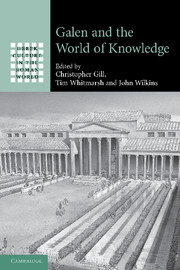Book contents
- Frontmatter
- Contents
- Notes on contributors
- Note on conventions
- Preface
- Introduction
- 1 Galen's library
- 2 Conventions of prefatory self-presentation in Galen's On the Order of My Own Books
- 3 Demiurge and Emperor in Galen's world of knowledge
- 4 Shock and awe: the performance dimension of Galen's anatomy demonstrations
- 5 Galen's un-Hippocratic case-histories
- 6 Staging the past, staging oneself: Galen on Hellenistic exegetical traditions
- 7 Galen and Hippocratic medicine: language and practice
- 8 Galen's Bios and Methodos: from ways of life to path of knowledge
- 9 Does Galen have a medical programme for intellectuals and the faculties of the intellect?
- 10 Galen on the limitations of knowledge
- 11 Galen and Middle Platonism
- 12 ‘Aristotle! What a thing for you to say!’ Galen's engagement with Aristotle and Aristotelians
- 13 Galen and the Stoics, or: the art of not naming
- Bibliography
- Index
7 - Galen and Hippocratic medicine: language and practice
Published online by Cambridge University Press: 06 August 2010
- Frontmatter
- Contents
- Notes on contributors
- Note on conventions
- Preface
- Introduction
- 1 Galen's library
- 2 Conventions of prefatory self-presentation in Galen's On the Order of My Own Books
- 3 Demiurge and Emperor in Galen's world of knowledge
- 4 Shock and awe: the performance dimension of Galen's anatomy demonstrations
- 5 Galen's un-Hippocratic case-histories
- 6 Staging the past, staging oneself: Galen on Hellenistic exegetical traditions
- 7 Galen and Hippocratic medicine: language and practice
- 8 Galen's Bios and Methodos: from ways of life to path of knowledge
- 9 Does Galen have a medical programme for intellectuals and the faculties of the intellect?
- 10 Galen on the limitations of knowledge
- 11 Galen and Middle Platonism
- 12 ‘Aristotle! What a thing for you to say!’ Galen's engagement with Aristotle and Aristotelians
- 13 Galen and the Stoics, or: the art of not naming
- Bibliography
- Index
Summary
There is but one Greece, though many Grecian cities.
When you employ a local word, what it is
is Attic; what we Greeks say though, is Greek.
Why be so much concerned with how you speak,
syllables, letters and the rest of it
that you make other folks dislike your wit?
Ἑλλὰς μέν ἐστι μία, πόλεις δὲ πλείονες.
σὺ μὲν ἀττικίζεις, ἡνίκ, ἂν ϕωνὴν λέγηις
αὑτοῦ τιν᾽, οἱ δ᾽ Ἕλληνες ἑλληνίζομεν.
τί προσδιατρίβων συλλαβαῖς καὶ γράμμασιν
τὴν εὐτραπελίαν εἰς ἀηδίαν ἄγεις;
Posidippus fr. 30 Kassel-Austin (trans. Edmonds)At the 2002 Entretiens Hardt, on the topic of Galen and philosophy, I delivered a paper in which I highlighted the complexity of Galen's cultural presuppositions in his concrete analysis of the language of Hippocrates. During the discussion session, I was asked what Galen meant by sunētheia, by language usage, a concept I referred to frequently during my presentation. At that particular moment I gave a provisional and summary answer, adding that the point deserved an independent study. On this occasion, I report on at least the first stage of this study.
My investigation will not be limited to the semantics of a single word: rather, I hope to describe in greater detail the approach Galen adopted with regard to the debate that was at the forefront of linguistic culture – and of cultural enquiry in general – during that period, which focused on the question of a model language advocated by so-called Atticism.
- Type
- Chapter
- Information
- Galen and the World of Knowledge , pp. 157 - 174Publisher: Cambridge University PressPrint publication year: 2009
- 3
- Cited by

